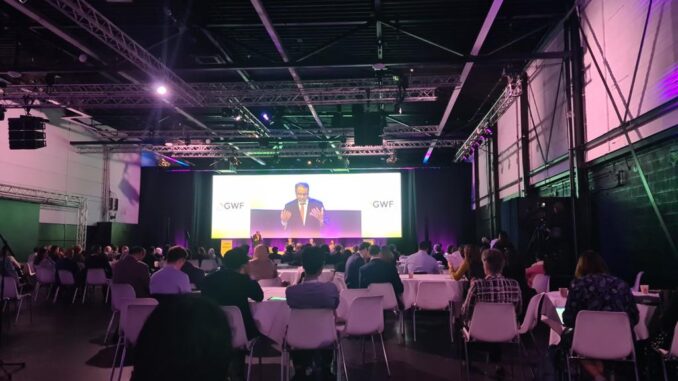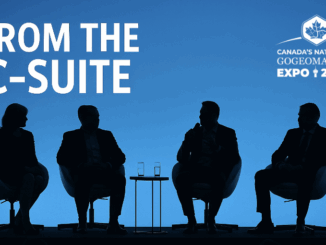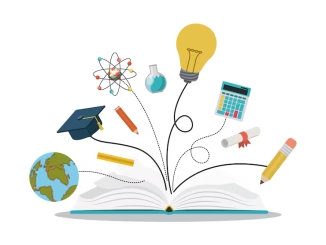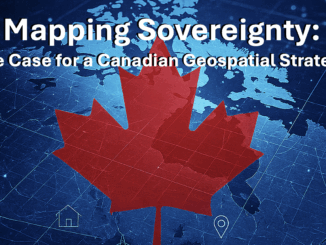
Amsterdam, May 10: Geospatial World Forum 2022 (GWF 2022), one of the most prestigious geospatial conferences and annual gatherings of geospatial professionals from across the globe, kicked off in Amsterdam on May 10, at the Taets Art and Event Park Amsterdam – Zaanstad. The three-day conference, which runs till 12 May, is produced by Geospatial World and co-hosted by Dutch Kadaster.
With the theme “Geography & Humanity”, GWF 2022 aims to trace the historical relevance of the geospatial profession, depicting its current value and setting the tone for the future. Discussions will revolve around the interaction between geography and humanity concerning the sustainability of not only the ecosystems but also the interdependent society and economy.
Year 2022 also marks Geospatial World’s 25 years of service.
Sanjay Kumar, Founder & CEO, Geospatial World opened the conference with his talk on the importance of geography and humanity. “There can’t be a better time than this to discuss ‘Connecting Geography and Humanity’ as the world talks about sustainability, and we are going through transformative challenges beyond COVID, such as climate change or geopolitics.” He said geospatial technology adds a crucial spatial dimension to knowledge infrastructure, and is a key to achieve sustainability.
The occasion also saw a congratulatory message fromNarendra Modi, Prime Minister of India, which was read out by Kumar. In the message, Modi said, “In today’s technology-driven age, geospatial knowledge plays a crucial role towards socio-economic development. It is imperative for nations and societies to invest in making geospatial knowledge infrastructure vibrant.”
He also underlined that in the past eight years, the Indian government has undertaken wide-ranging measures to deepen the reach of geospatial services for all-around development. “We have liberalized policies related to geospatial data to bring a positive transformation in the lives of common man with the help of technology and facilitate the development of Indian geospatial innovations to empower small businesses. India’s efforts emphasize on unlocking immense opportunities for startups and entrepreneurs by promoting research in creation of digital public goods. It will open new avenues for location-based services and create huge employment opportunities for our youth,” he said.
In his introductory remark Frank Tierolff, Chair Executive Board, Kadaster, The Netherlands said, “SDGs (sustainable development goals) embody a better world that we want to create for ourselves and future generations. SDGs require sound, reliable and actual information.” He shared an interesting journey of Kadaster. “At a time of mega transformations and disruptions, navigating uncertainty and precarity for the shore of certainty is what concrete planning is all about in an ever-changing world, certainty is as important as freedom,” he said.
As part of his ministerial address, Malaysia’s Minister of Science, Technology and Innovation YB Dato’ Sri Dr. Adham bin Baba, said, “I am confident that the sharing and takeaways from this intellectual discourse would provide an important impetus for the global communities to collectively address common challenges and take affirmative actions that are science and evidence-based in order to achieve sustainable development.”
The adoption of geospatial technologies has great potential to strengthen Malaysia’s competitiveness in critical areas, such as food security, forest management, physical development planning, as well as national defence and security. “The Malaysia Space-X 2030 Blueprint aims to create a comprehensive national space ecosystem. To support the blueprint, the Malaysian Space Agency (MYSA) has developed 40 centralized and integrated space-based remote sensing and geospatial application systems and databases that have managed to improve public service delivery through the increased use of space technology,” the Minister highlighted.
Congratulating the Forum, Reenat Sandhu Ambassador of India to the Kingdom of the Netherlands said, “Technology has reshaped and continues to reshape the world around us. In today’s technology driven age, geospatial knowledge plays a crucial role. India’s geospatial economy was valued at about USD 5 billion in 2021 and employs approximately 470,000 people across the country. By 2025, the geospatial economy has the potential to grow to more than USD 8 billion with employment in the sector rising to over 950,000 people. There is therefore a huge potential that is yet to be realized. The Government of India has been creating an enabling environment to facilitate private participation in the geospatial services.”
In her address YB Chong Eng, Executive Councillor for Social Development & Non-Islamic Religious Affairs, Penang State Government, Malaysia said, “The theme of this forum, ‘Geography and Humanity’, highlights the link between geography and social connectivity. As we have discovered during the pandemic, it is particularly important to maintain this link in times of crisis. During the COVID-19 pandemic, the use of digital technologies has been instrumental in bridging the geographic divide to keep individuals and communities connected to the governments and civil society organizations mandated to serve them.”
Value of geospatial technologies
Geospatial and location technologies have been foundational to the digital revolution, and have taken a centerstage since the outbreak of the COVID-19 pandemic. With climate change-induced extreme weather impacts and geopolitical tensions in Europe and other parts of the world now adding to the problems, the role of geospatial data and technologies is expected to become more crucial.
The Global Geospatial Market Size is estimated to be USD 452 billion in 2022. It is forecasted to grow at 14.61 percent CAGR reaching USD 681 billion by 2025. However, after 2025, the industry is expected to grow at a much faster rate of 16.1 percent, touching USD 1.44 trillion by 2030, according to the GeoBuiz-22: Global Geospatial Industry Outlook Report that came out last month.
According to the annual report produced by GW Consulting, Geospatial World’s consulting division, the current growth rate is driven by technology innovation, integration of workflows, and augmentation of spatial analytics in business processes. The spurt in growth post 2025 will be due to the current public policy reforms and increasing investments in geospatial infrastructure (both public and private) and industry acceleration programs worldwide. The growth impact of public policies and industrial acceleration is estimated to be USD 373 billion between 2025 to 2030 as compared to USD 38 billion in the year 2025, carving out a greater role for national geospatial agencies and governments.
About Geospatial World Forum
Geospatial World Forum is one of the most prestigious global geospatial conferences and annual gatherings of geospatial professionals across the world. This year’s edition GWF 2022 runs from May 10 to May 12 at the Taets Art and Event Park, Zaanstad, Amsterdam. The three-day conference is produced by Geospatial World and co-hosted by Dutch Kadaster.
Visit website for more information: https://geospatialworldforum.org/index.html
About Geospatial World
Geospatial World is a global think tank working towards raising awareness around the use of geospatial data and technologies among governments and policymakers, businesses, and the public at large. Its mission is ‘Making a Difference through Geospatial Knowledge in World Economy and Society’. Primarily a knowledge organization, Geospatial World pursues thought leadership, policy advocacy and technology evangelism through various activities and platforms.
Visit website for more information: https://www.geospatialworld.net/
Media Contacts
Anusuya Datta
Vice President, Marketing and Communications
[email protected]
Meenal Dhande
Associate Editor & Product Manager – Europe
[email protected]




Be the first to comment